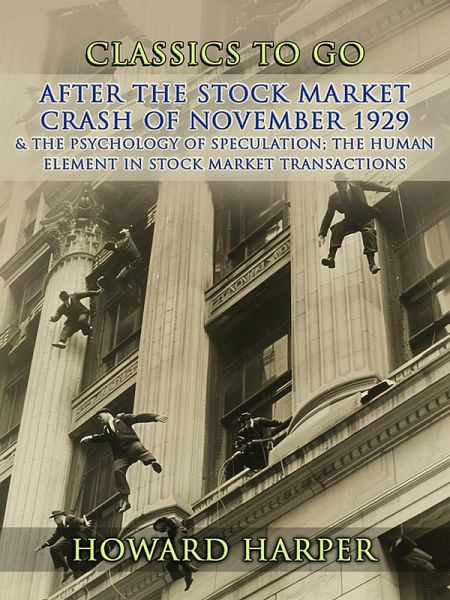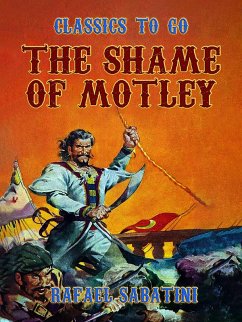
After the Stock Market Crash of November 1929 & The Psychology of Speculation The Human Element in Stock Market Transactions (eBook, ePUB)

PAYBACK Punkte
0 °P sammeln!
After the Stock Market Crash of November 1929 & The Psychology of Speculation: The Human Element in Stock Market Transactions, by Howard Harper, offers a gripping exploration of the financial cataclysm that reshaped the world and the psychological factors driving human behavior in the stock market. The book delves into the turbulent aftermath of the 1929 crash, examining not only the economic repercussions but also the profound psychological impact on investors and society at large. Harper masterfully blends historical analysis with psychological insights, making the book a compelling read for...
After the Stock Market Crash of November 1929 & The Psychology of Speculation: The Human Element in Stock Market Transactions, by Howard Harper, offers a gripping exploration of the financial cataclysm that reshaped the world and the psychological factors driving human behavior in the stock market. The book delves into the turbulent aftermath of the 1929 crash, examining not only the economic repercussions but also the profound psychological impact on investors and society at large. Harper masterfully blends historical analysis with psychological insights, making the book a compelling read for modern audiences intrigued by the complexities of human behavior in financial markets. The book's themes are strikingly relevant today, as we continue to witness market volatility and the enduring influence of speculation. One of the central themes is the cyclical nature of financial markets, highlighting how periods of boom and bust are often driven by collective human emotions rather than purely economic fundamentals. Harper illustrates this through vivid anecdotes from the 1929 crash, drawing parallels to recent financial crises such as the 2008 recession and the market fluctuations during the COVID-19 pandemic. This theme resonates with modern readers, reminding us of the importance of understanding the psychological drivers behind market movements. Another key theme is the role of speculation and its potential to create bubbles and subsequent crashes. Harper delves into the mindset of speculators, exploring how greed, fear, and herd mentality can lead to irrational decision-making. This theme is particularly relevant in today's context, where the rise of retail investors and the proliferation of online trading platforms have democratized access to the stock market but also increased the potential for speculative bubbles. Examples like the GameStop frenzy and the cryptocurrency boom underscore the timeless relevance of Harper's insights. The book also addresses the human element in stock market transactions, emphasizing the importance of psychological resilience and emotional intelligence. Harper discusses how investors can mitigate the adverse effects of market volatility by cultivating a balanced mindset and avoiding impulsive decisions. This advice is crucial for modern readers navigating the uncertainties of today's financial landscape, where rapid technological advancements and global interconnectedness can amplify market swings. Furthermore, Harper's exploration of the broader societal impact of financial crashes is particularly poignant. He examines how the 1929 crash led to widespread economic hardship, social unrest, and significant policy changes, drawing connections to contemporary issues such as income inequality, regulatory reform, and the social consequences of economic downturns. This theme highlights the interconnectedness of financial markets and society, urging readers to consider the broader implications of their investment choices. In conclusion, After the Stock Market Crash of November 1929 & The Psychology of Speculation is a timeless and insightful work that offers valuable lessons for modern readers. By weaving together historical analysis, psychological insights, and contemporary relevance, Howard Harper provides a comprehensive understanding of the human elements driving financial markets. This book is not only an engaging read but also a vital resource for anyone looking to navigate the complexities of today's financial world with greater awareness and resilience.
Dieser Download kann aus rechtlichen Gründen nur mit Rechnungsadresse in A, B, BG, CY, CZ, D, DK, EW, E, FIN, F, GR, HR, H, IRL, I, LT, L, LR, M, NL, PL, P, R, S, SLO, SK ausgeliefert werden.













